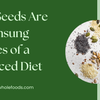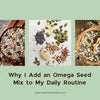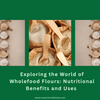What Are Organic Wholefoods and Why Are They So Good for You?
- by K V
At their core, wholefoods are foods that are minimally processed and close to their natural state. This includes things like whole grains, legumes, nuts, seeds, fruit, and vegetables. The idea is to eat ingredients that haven’t been stripped of their fibre, nutrients, or goodness. Now, when something is labelled organic, it means it’s been grown or produced without artificial chemicals, pesticides, or genetically modified organisms. Put the two together, and you’ve got food that’s simple, natural, and grown with care.
Why Do Organic Wholefoods Matter?
Eating organic wholefoods can have a positive impact on your overall wellbeing. Because these foods are unrefined and chemical-free, they’re often richer in vitamins, minerals, and antioxidants. Many people find they have more energy, improved digestion, and fewer cravings when they eat this way. It’s not just about what you’re getting – it’s also about what you’re avoiding. By choosing organic wholefoods, you’re cutting out the artificial additives and heavily processed ingredients that can weigh you down over time.
It's Not About Perfection
One of the best things about embracing organic wholefoods is that it’s not about being perfect. You don’t need to buy everything organic or make drastic changes overnight. Even small shifts – like swapping out heavily processed snacks for nuts or fruit, or adding more whole grains to your meals – can make a real difference. It’s about finding balance and gradually building habits that support how you want to feel, rather than sticking to rigid rules.
Final Thoughts
Organic wholefoods are more than just a trend – they’re a return to eating in a way that’s simple, nourishing, and sustainable. Whether you're making big changes or just dipping your toes in, focusing on real, natural ingredients is a great place to start. It’s not about being perfect, it’s about feeling good – and wholefoods make that a little easier, one bite at a time.





